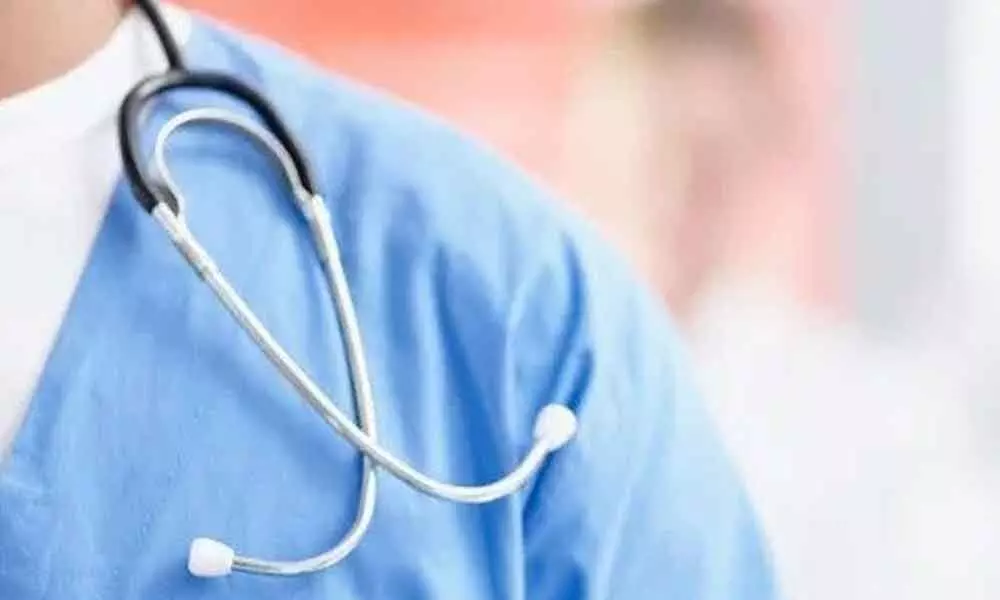Live
- Telangana IT Minister D. Sridhar Babu Highlights Future City Vision and Data Center Growth at IAMPHENOM Event
- Quota stir: Panchamasali seer violated law, claims Siddaramaiah
- India vs Australia: Third Test at Gabba – Match Timings and Details
- Allu Arjun’s team denies arrest rumors; gives clarity
- Film actor Mohan Babu knocks High Court doors. Requests for anticipatory bail
- Allu Arjun Seeks Lunch Motion; Court Hearing Scheduled for 2 PM Today
- Vijayawada hosts Swarnandhra Vision-2047 Program to foster development in AP
- World Bank okays loan for new project to boost earnings of UP farmers
- Zomato gets GST tax demand notice of Rs 803 crore
- Atul Subhash suicide: No arrests made yet, says Bengaluru Police Commissioner
Just In
Two Indian- American doctors seek to arrest tsunami of cancer in India


Two eminent Indian-American doctors, known for their pioneering research and treatment of cancer patients, are seeking to arrest what they describe as "tsunami" of the deadly disease that has now engulfed India through a massive effort of early detection and health education.
Two eminent Indian-American doctors, known for their pioneering research and treatment of cancer patients, are seeking to arrest what they describe as "tsunami" of the deadly disease that has now engulfed India through a massive effort of early detection and health education.
Dattatreyudu Nori, an internationally acclaimed oncologist, who has treated several top Indian leaders suffering from cancer going back to former president late Neelam Sanjeev Reddy, and Rekha Bhandari an eminent geriatrics and specialising in pain medicine, warn that if enough appropriate and urgent steps were not taken, their country of birth is facing an eminent "tsunami" of cancer.
"There are 1,300 deaths per day in India due to cancer. We have approximately 1.2 million new cancer cases every year in India. This indicates lower rates of early detection and poor treatment outcomes," Nori told PTI.
The New York-based Indian-American doctor who is known for successfully curing several top Indian leaders, maintains a low profile and avoids talking to the media. Cancer, he said, can have profound social and economic consequences for the people in India often leading to family impoverishment and societal inequity.
The International Agency for Research on Cancer has predicted that by 2030, as many as 1.7 million new people would be detected of cancer every year. "Unless, we take some steps, cancer is (all set to) become like a tsunami," said Nori, adding that diagnosis in India often leads to catastrophic personal health expenditure that can push an entire family below the poverty line.
Describing this as a major public health care challenge for India, the 2015 Padma Shri awardee is inspired by the 'Ayushman Bharat project' of Prime Minister Narendra Modi and his decision to establish National Cancer Registry programme.
These are crucial steps in the right direction, Nori joined by Bhandari argue that early detection and a massive health education is key to addressing the public health challenge posed by cancer.
Both the doctors are recipient of the prestigious Ellis Island Medal of Honour, the highest civilian award in the US for immigrants. It is given annually to individuals whose accomplishments in their field and service to the country are cause for celebration. Among its previous recipients includes several US presidents including Donald Trump and Nobel Prize winners.
"Make cancer a notifiable disease," Nori said referring to his series of recommendations to the Indian government, while Bhandari is working on using new tools of information technologies like blockchain and artificial intelligence for early detection of cancer in India.
Majority of cancers in India are mainly due to tobacco. Bhandari, Chief of Pediatric and Palliative at the Kingsbrook Jewish Medical Center, argues that even though India has a young population it's time the country starts planning for 20 years from now, when it would have the world largest aged population.
If enough preventive measures, including early detection and health education, are not done now and necessary health infrastructure are not created, India will face an unimaginable health crisis.
"I am very pleased with the establishment of National Cancer Registry and Ayushman Bharat Programme," he said. Among other major recommendations by the two doctors include establishing a cancer hotline, adopting precision medicine, precision screening and early detection, setting up regional cancer palliative centers, and setting up task forces for specific diseases that have alarmingly very high rates of incidence like breast cancer and cervical cancer.
"If you want to control the tsunami of cancer, we need to initiate, accelerate early detection. This can cure cancers and can have less expensive treatments," said Nori.
"The key to success in Indian scenario for cancer care is mostly prevention if it can be done early detection. These are the two key programmes that will change the outlook for cancer in India in next 10 years and maybe even reverse the expected incidence rates," he said.
Nori also called for strengthening cancer care programmes in all medical colleges, giving six-months oncology training to doctors at the district level and make them liaison physician for the district so that they can implement treatment guidelines and refer them to regional cancer centers if necessary.
"There should be a massive campaign on health education on cancer in schools, colleges and universities on tobacco control," he said, adding that the government should consider pediatric cancer care be provided free of charge.
Noting that chemotherapy drugs are expensive, he called for a task force to develop a partnership between pharmaceutical industry and National Cancer Institute to incentivise them to produce cancer drugs locally.

© 2024 Hyderabad Media House Limited/The Hans India. All rights reserved. Powered by hocalwire.com






